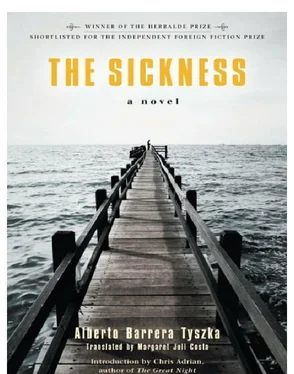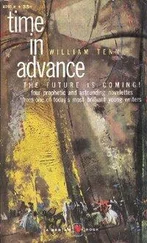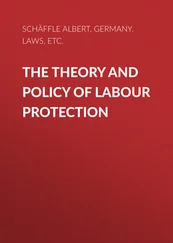“What a shame I was at your apartment,” murmurs Javier. “I hope the kids weren’t upset.”
“Don’t worry. If it had been at your place, you would have been all alone.”
Javier Miranda thinks about this for a second. He tries to speak, but it’s very hard. Everything is getting harder and harder, everything is an effort.
“You shouldn’t have let Merny take all that time off to go to Mérida.”
“It was a deal we made,” he murmurs.
Andrés nods. His father closes his eyes again. He’s breathing with difficulty. Andrés looks for something to do: he checks the flow of saline solution, checks the information on the medical records left on the bedside table. None of those facts and figures mean much now. Every patient writes his own history. The stories told by illnesses each follow a different order, a different rhythm. They never repeat themselves, even though all have the same ending.
Andrés goes back to his father’s side. He takes his pulse, places his other hand on his forehead. The cold is edging nearer. Andrés wishes he could lie down beside him as he had before, embrace him and weep. His father again tries to say something, but can’t; he opens his mouth, clears his throat, attempts a sound and can manage only silence; his tongue is dry; the words he can no longer speak, that he no longer has, hurt him.
“Don’t try to speak,” Andrés says. “Don’t say anything.”
He feels tears burning beneath his eyelids. They sting. He doesn’t know what to do. He once more places his hand on his father’s forehead. Suddenly they look at each other. Andrés sees that his father is quietly crying too. He kisses him again and squeezes his hand.
“Everything changed,” Andrés sobs. “Ever since I told you that you were ill. Ever since we knew.”
His father shakes his head, as if to stop him speaking. Andrés won’t be silenced.
“No, it’s true, we both changed. We didn’t know how to handle it. We got angry, it freaked us out. . We should have talked more — I don’t know — tried to have a better time together.”
His father looks at him and smiles fondly. He swallows hard and makes as if to touch his son’s face, but that feeble gesture quickly fades. Andrés wipes the tears from his father’s cheek.
“This isn’t something you can rehearse for,” his father murmurs, jokingly, as if trying to make light of the situation. “No one told us it would be like this.”
Three floors up, in the office, Karina is still phoning relatives and friends, as Mariana had asked her to do. Call the people closest to him and explain the situation. The inevitable has happened. She has done this, feeling rather awkward and nervous. She doesn’t quite know how to explain. What can she say? That the inevitable has happened and they should come quickly because his life is nearly at an end? Just as she’s about to make another call, a little icon appears on her screen: a new e-mail has arrived in her inbox. She immediately puts the phone down and turns to the computer. She feels even more excited when she sees the name of the sender: Ernesto Durán.
Dear Dr. Miranda,
I hesitated for a long time before writing to you again. I finally decided that I would and I’m going to explain why. I haven’t heard from you for a while now. The last time I wrote, I was in the middle of a crisis, I asked you for help and you failed me. You never phoned. I was in urgent need of help, and you didn’t come.
It wasn’t easy. It took me weeks to recover, but fortunately my body slowly pulled itself together and, eventually, my condition stabilized. All this has had its consequences, of course. Among other things, let me just say that I lost my job. Gradually, though, I’m returning to normality. I can’t deny that, at first, I felt very bitter toward you. I determined that I wouldn’t write to you again. And I didn’t. I never again sent you an e-mail. I didn’t follow you either. I didn’t come to the hospital looking for you. I wanted to erase you from my life, Doctor.
“Has he finally replied?” Adelaida is standing in the doorway, watching her. “I know your face, Karina. It’s from him, isn’t it?”
Karina nods, rather put out by the interruption.
“So what does he say?”
“It isn’t for me. It’s for Dr. Miranda.”
“I don’t believe you,” exclaims Adelaida, coming to peer at the screen over Karina’s shoulder.
But I couldn’t do it, Doctor. Every day, I woke up with the same feeling of emptiness in my hands, as if something was missing. I went to bed with the same anxiety. This wasn’t just a repetition of my old symptoms, it was something else, something much deeper. Then, this morning when I woke up, I saw everything so clearly. I need to write to you, Doctor. Even though you’ve let me down, even though you don’t read my letters, despite all that, I need to write to you.
If you answer me, that’s fine. If you don’t, it doesn’t matter. But writing is the one thing that makes me feel better, the only thing I really need. Before, I always thought that one wrote for other people, for the other person to read what one had written. Now I’m not so sure.
“The guy’s nuts!” mutters Adelaida. “Doesn’t he say anything about that time he came to see the doctor? Or about the letter you wrote him? Doesn’t he say anything about that?”
“Exactly,” says Karina.
“What do you mean ‘exactly’?” Adelaida stares at her in bewilderment. “Don’t you see? That’s his only sickness.”
Karina nods, a strange, glad smile on her lips. And tapping lightly on the keyboard, she begins writing her response.
In the corridor on floor five, outside room 508, Mariana and her children are waiting in silence. Inside, Andrés, for how long he doesn’t know, has been sitting bent over his father, an uncomfortable position, but it’s the only way he can get close to him. Everything is so ephemeral. They are the only solid thing in that room. When he hears his father cough, he sits up. They look at each other again.
“What do you want? What can I do for you?”
His father thinks for a moment.
“Talk to me,” he says with some difficulty, as if he had to drag the words to his lips. “Talk to me about us.”
Silence is a sharp stake. Andrés feels as if his tongue were a stone in his mouth. Then he realizes that this is all they have, the one shared thing that remains to them: their last words. That hoarse, weak voice signals the end of the body, sound is the only bit of life they still have.
What are last words like? What do they taste of?
His father makes a small gesture, again reaches out his hand, as if to draw him closer, to have his son still nearer. Andrés bends forward, almost crouched over him now.
“This is how I want to go,” murmurs his father. “Listening to you talking.”
And he again closes his eyes. Perhaps even opening and closing his eyes hurts him now. Passing the time hurts too.
Andrés feels as if his mouth were full of tree bark. He feels a deep, deep sadness. He’s crying, not holding back now, not trying to stop his tears. His father’s hand between his two hands feels ever lighter. Why do we find it so hard to accept that life is pure chance?
His father opens his eyes again, tries to smile, and gives him instead a look of fragile tenderness.
“Talk to me,” he says again. “Don’t let me die in silence.”
The translator would like to thank Alberto Barrera Tyszka for all his help, and, as always, Annella McDermott and Ben Sherriff.
ALBERTO BARRERA TYSZKA, poet and novelist, is well known in Venezuela for his Sunday column in the newspaper El Nacional . He cowrote the internationally best-selling and critically acclaimed Hugo Chávez , the first biography of the Venezuelan president. The Sickness won the prestigious Premio Herralde — an honor previously bestowed on Roberto Bolaño and Javier Marias, among others — and was shortlisted for the Independent Foreign Fiction Prize in 2011.
Читать дальше












